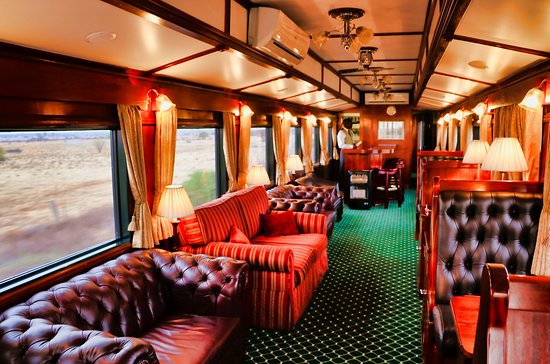
Keeping Luxury on track with Tiffany Vos-Thane
We recently had the chance to sit down with Rovos Rail’s Chief Operating Officer, Tiffany Vos-Thane, for an illuminating interview delving into her unique journey – in particular, what it means to be steering her family’s legendary passenger trains with a combination of empathy, precision planning, agility and surprisingly, surrender…
Tell us about your earliest memory of Rovos Rail?
I can distinctly remember when my parents still operated Rovos Rail from a gracious heritage building in the heart of Pretoria. I would proudly walk our guests straight from the hotel across the flower-lined road to the station, with my parents in tow. I can still recall the feeling of excitement emanating from our guests about to board their train, surrounded by the hustle and bustle of the station and feeling such a sense of pride as my sisters and I would help them board.

It was just the most incredible experience from the nicest guests to amazing team members – it all worked. I definitely think that feeling of chatting to guests and being able to be so confident from such a young age had me hooked on hospitality. I have such immense pride at what my parents had achieved at a time when South Africa wasn’t even known for tourism.
Thanks to them I am lucky to drive to work every day with immense gratitude.
When did your journey start with Rovos?
I was fortunate to be exposed to travel from a young age, travelling on Rovos Rail during most of my school holidays while my parents worked. I always knew I would end up in hospitality one way or another.
I studied hospitality, working my way up from laundry, kitchen, to admin, eventually working across every department. After securing my first paid job at the Mount Nelson, A Belmond Hotel, and with some solid sales experience under my belt, I made my way to London where I spent eight years with Starwood Hotels.
My parents never put pressure on me to join the family business, which now upon looking back I really appreciate, as I had the freedom to forge my own path in business.
After getting married, I made my return to SA and Rovos Rail, with no job title! If I was going to make my mark on an already successful business I had to start from scratch. It was critical that I experienced how each department ran before even thinking of moving to sales and marketing. That meant focusing exclusively on operations; think locomotives, kitchen, housekeeping, F&B, logistics and most importantly, remaining humble in doing so as there was so much for me to learn from the team, most notably that this is not a hotel.
When it came to the change management process at Rovos Rail my mindset had to adapt quickly to the reality that first class luxury at Rovos Rail was unlike any other high-end travel product. My goal was to formalise aspects of the business without losing the core of what makes Rovos Rail so special.
What is the number 1 fact you wish people knew about Rovos?
That there are just under 500 dedicated staff making the business work.
So much goes into the eco-system of the entire operation from the smallest, often unseen details to critical mechanical aspects that ensure our trains operate at the highest levels.
I take caring for our team seriously and work to protect every element of the team – the passion and energy of the Rovos Rail team reflects a commitment that is so deeply rooted. You can feel that you are really a part of something and it makes it all worthwhile.
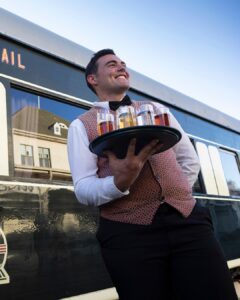
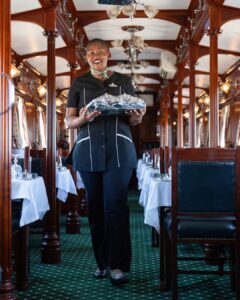
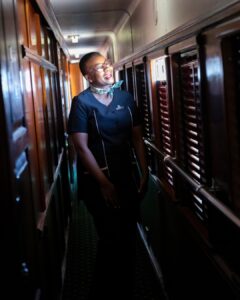
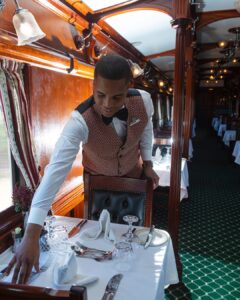
Rovos Rail is celebrated for its world-class hospitality yet behind the scenes, you’re moving trains across vast African landscapes. How do you balance the guest experience with the immense logistical challenges?
Rovos Rail’s inception was borne from my parents’ vision to create an experience that was completely different from any other luxury train offering. With the landscape of South Africa as a backdrop, the question was how to amplify the onboard experience to match such spectacular scenery?
Their answer was to create more space on board versus other trains; space is luxury that offers reflection, privacy and complements the entire experience… Next was understanding how we wanted people to feel – the magic was striking a balance of offering something for everyone whether that be a retreat, socialising, discretion along with every possible amenity.
We empower our team to approach every guest interaction with an attitude of “Why not” – they are skilled to anticipate what the guest requires, sometimes even before the guest does. Each guest is seen as an individual with specific needs and it’s our responsibility to deliver the type of service that makes them feel cared for.
Along with highly experienced staff, we do have several contingency plans in place for most eventualities just in case…
Post-trip reviews after each train journey are a must as this contributes to on-going training that keeps the team agile and always learning. With a team as dedicated and skilled as this, we train to retain, often bringing in external companies for support.
Your routes span multiple countries, each with its own infrastructure, regulations, and complexities. What are the biggest hurdles of cross-border operations, and how do you overcome them?
Over 36 years, operating in 10 countries, results in a company that is well versed in the intricacies required to navigate railway networks, visas and immigration processes. In Africa it’s not the norm for these regions to work with passenger trains so it’s up to the team to prepare for every eventuality as we’re dealing with people not goods – sometimes the railways can forget this.
When it comes to our established destinations we have the running times, distances and speeds down to a fine art. Newer countries like the DRC and Angola have proven to be more challenging with unpredictable running times, visa restrictions – We try to control the visa process for our guests so it’s seamless for them.
To keep our operations running efficiently we have our very own in-house upholsterer; in-house liquor shop; in-house hardware – in total 17 different departments where we can control what we can. It all comes down to a team working with patience and building relationships to make things happen and not working against the realities…this is where I have had to learn to let go, and focus on what we can control.
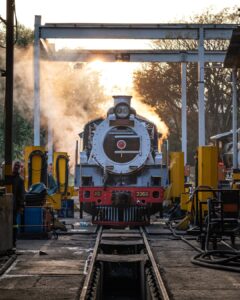
Luxury travel increasingly demands a responsible approach. How is Rovos Rail addressing sustainability—both environmentally and socially—while still maintaining its hallmark of indulgence?
One of the first projects I implemented was the Green Journey – ways to enhance the guest experiences without losing quality.
- – All documents are printed onto seed paper and they are planted at Capital Park
- – Removed all plastic from our operations
- – Recycling plant at Capital Park where a team of 4 process our waste; glass and tin
- – Vacuum toilet being trialled on the train – uses 90% less water than traditional toilets
- – Installed water tanks in the DRC
- – Source locally – cane toilet paper; all gifts; bio-degradable golf balls; note pads; weather cards; snack boxes etc. My mom handles all the linen and interiors for our trains, sourcing from local suppliers that adhere to ethical production.
Rovos operates a diverse fleet of locomotives: 11 diesel, 8 electric, and 4 hybrid diesel/electric locomotives.Diesel locomotives are very demanding high-powered machines. We are investigating other solutions to minimise fuel consumption, however rail travel in Africa does mean travelling through areas with no electricity at times and fuel is a necessity.
We continue to work with suppliers and partners that collaborate with community leaders to bring support to these regions.
With new luxury products constantly entering the African market – private jets, villas, experiential lodges – how does Rovos Rail ensure it remains relevant and aspirational to the next generation of high-net-worth travellers?
More people are wanting to disconnect and the tradition of rail travel has always included spaces with no cell-phones; in fact we’re only just introducing wi-fi to some trains. Train travel was a ‘lost form of travel’, and while there may be a temptation to ‘stay connected’, I believe our power lies in staying true to the core value of a Rovos experience.
Transporting guests in what is essentially a moving 5 star hotel through countries that they may never get the chance to see at a slower pace connects our guests to a bygone era – a time to reconnect with yourself… that is our difference.
From pandemics to political instability, Africa’s landscape can change overnight. What has been the most difficult crisis you’ve had to manage, and what lessons did you learn from it?
Covid, there has been no bigger challenge. When the borders shut no one truly understood what it meant … I dealt with sales and reservations refunding our guests, whilst my dad was dealing with operations and crisis management. He secured maintenance deals to keep our trains serviced. During this time I reached out to other companies to find out their cancellations policies and didn’t have the contacts and felt very alone.
Today, I have so many people to lean on. We tried to hang on and treat people with transparency and kindness throughout. We were able to keep train staff for 7-months, keeping 350 staff employed out of 500. This was only possible because we had a ‘war chest’ – a valuable lesson from my father who had survived other volatile periods i.e. wars; Iceland’s volcanic ash clouds, political conflict, thanks to his conservative savings.
From your perspective as COO, what does it take to lead a business at the intersection of hospitality and logistics in Africa, and what advice would you give to others entering this space?
I’ve learnt you have to be willing to humble yourself. Humility is something that many leaders feel embarrassed by – my father and I are polar opposites but we have an undercurrent of leading by example and working hard, and it really does earn people’s respect. I love learning and asking questions.
Being vulnerable has proven to be an asset when it came to building relationships with staff when I came on board. It makes them feel they can be open with me and that brings me joy. Another skill is leveraging my team’s expertise and learning from everyone, because everyone has something to offer, it may just take some time and patience.
As a result, our team takes accountability because they care and are willing to adapt for the benefit of the company.





